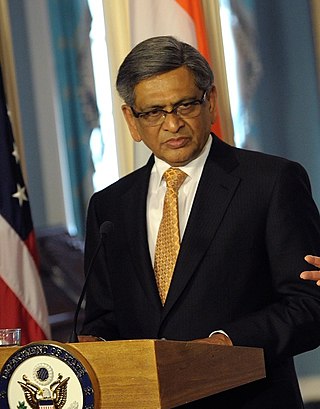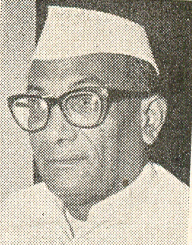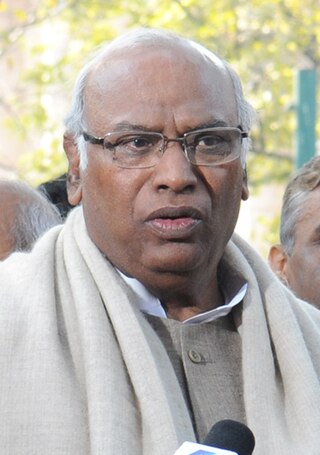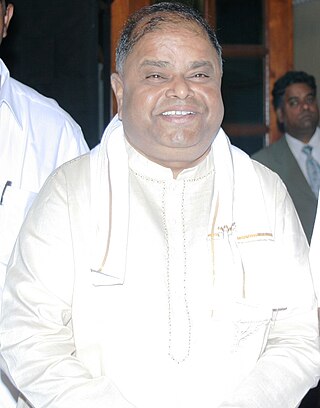
The Indian National Congress (INC), colloquially the Congress Party or simply the Congress, is a political party in India with deep roots in most regions of India. Founded on 28 December 1885, it was the first modern nationalist movement to emerge in the British Empire in Asia and Africa. From the late 19th century, and especially after 1920, under the leadership of Mahatma Gandhi, the Congress became the principal leader of the Indian independence movement. The Congress led India to independence from the United Kingdom, and significantly influenced other anti-colonial nationalist movements in the British Empire.

Shankarrao Bhavrao Chavan was an Indian politician who served as the chief minister of Maharashtra twice from 1975 until 1977 and from 13 March 1986 until 26 June 1988. He was the finance minister of India from 1988 to 1989 in Rajiv Gandhi ministry. He also served as the home minister of India twice, from 31 December 1984 to 12 March 1986 in the Rajiv Gandhi cabinet, and from 21 June 1991 to 16 May 1996 in the P. V. Narasimha Rao cabinet.

Manmohan Singh is an Indian retired politician, economist, academician and bureaucrat who served as the 13th Prime Minister of India from 2004 to 2014. He is the third longest-serving prime minister after Jawaharlal Nehru and Indira Gandhi. A member of the Indian National Congress, Singh was the first Sikh prime minister of India. He was also the first prime minister since Jawaharlal Nehru to be re-elected after completing a full five-year term. Singh is also regarded as the most educated prime minister of India.

Somanahalli Mallaiah Krishna is an Indian politician who served as Minister of External Affairs of India from 2009 to October 2012. He was the 10th Chief Minister of Karnataka from 1999 to 2004 and the 19th Governor of Maharashtra from 2004 to 2008. SM Krishna had served as the Speaker of the Karnataka Vidhan Sabha from December 1989 to January 1993. He was also a member of Lok Sabha and Rajya Sabha at various times from 1971 to 2014. In 2023, Krishna was awarded the Padma Vibhushan, the second highest civilian award of India.

Kapil Sibal is an Indian lawyer and politician. A designated Senior Advocate, he has represented several high-profile cases in the Supreme Court of India and is widely regarded as one of the famous lawyers of India. He is a Member of Parliament, in Rajya Sabha.
The Indian Institutes of Technology (IITs) are the premier autonomous public technical and research universities located across India, founded under the leadership of Pandit Jawaharlal Nehru.

Ahmedbhai Muhamedbhai Patel, also known as Ahmed Patel, was an Indian politician and Member of Parliament from the Indian National Congress. He was the political secretary to Congress President Sonia Gandhi.
Satish C. Sharma was an Indian politician. He represented the Indian National Congress party, and was a former member of the Union Cabinet in the Government of India. Sharma's political career was boosted by his closeness to both Rajiv Gandhi, and after his assassination, his wife and the de facto political power center of the Congress party, Sonia Gandhi. He held seats in the Lok Sabha at the behest of both the Nehru-Gandhi family and the electorate.
Rajinder Kumar Dhawan was an Indian politician who was one of the leaders of the Indian National Congress and a member of the Rajya Sabha.

Gurmukh Singh Musafir was an Indian politician and Punjabi language writer. He was the 5th Chief Minister of Punjab from 1 November 1966 to 8 March 1967.

Jayanthi Natarajan is an Indian lawyer and politician. She was a member of the Indian National Congress and has been thrice elected Member of Parliament representing the state of Tamil Nadu in the Rajya Sabha. From July 2011 to December 2013, she was the Minister of Forests and Environment. She resigned as Minister of Environment and Forest on 21 December 2013. On 30 January 2015, she announced in a press conference at Chennai that she would be resigning from the Congress party alleging that "specific requests" by Rahul Gandhi were the basis of whether industrial projects were given clearances by her ministry, and that he shifted from a pro-environmental position to corporate-friendly stand for the elections in 2014.

Anand Sharma is an Indian politician and former Union Cabinet Minister in charge of Commerce and Industry and Textiles in the Government of India. Since June 2014, Sharma was the Deputy Leader of opposition in Rajya Sabha, the upper house of the Indian Parliament until 2022.

Prithviraj Chavan is an Indian politician who was the 17th Chief Minister of Maharashtra from 2010 to 2014. Chavan is a graduate of BITS Pilani and University of California, Berkeley in mechanical engineering. He spent time working in the field of aircraft instrumentation and designing audio recorders for anti-submarine warfare in the US before returning to India and becoming an entrepreneur in 1974. Referred to in the media as a technocrat with a clean, non-controversial image, a low-profile leader. Chavan served as the Minister of State in the Prime Minister's Office in the Ministry of Parliamentary Affairs and Ministry of Personnel, Public Grievances, and Pensions. Chavan was also General Secretary of the All-India Congress Committee (AICC), in-charge of many states, including Jammu and Kashmir, Karnataka, Haryana, Gujarat, Tripura, and Arunachal Pradesh.

Ajit Prasad Jain was an Indian politician who served as the President of the U. P. Congress Committee, member of the Constituent Assembly, Union minister and Governor of Kerala from Saharanpur, in the state of Uttar Pradesh, India.

Mapanna Mallikarjun Kharge is an Indian lawyer and politician serving as the President of the Indian National Congress since 2022, and Leader of the Opposition in Rajya Sabha since 2021. He has been a Member of Parliament, Rajya Sabha from Karnataka since 2020.

Chandra Shekhar, known as Jananayak, was an Indian politician who served as the 8th Prime Minister of India, between 10 November 1990 and 21 June 1991. He headed a minority government of a breakaway faction of the Janata Dal with outside support from the Indian National Congress. He was the first Indian Prime Minister who had never held any prior government office.

Sanjaya Sinh, also known as Sanjay Singh, is an Indian politician and a former member of the Rajya Sabha. He was twice elected to the Legislative Assembly of Uttar Pradesh during the 1980s and held state ministerial posts. In 1990, he became a member of the upper house of the Parliament of India, which is known as the Rajya Sabha, and in 1998 he was elected to the lower house, called the Lok Sabha. His term in the 12th Lok Sabha session lasted until the following year. Subsequently, in 2009, he was successful in obtaining a second term in that house as a member of the 15th Lok Sabha representing the Sultanpur constituency of Uttar Pradesh. He represented the state of Assam in the Rajya Sabha. He resigned from Rajya Sabha and Indian National Congress to join Bharatiya Janata Party on 30 July 2019.

K.C. Kondaiah, is an Indian politician and a former member of the Karnataka Legislative Council from Bellary. He is a former member of the Lok Sabha and Rajya Sabha from Karnataka.

Mohan Dharia was a Union minister, a lawyer and social worker. During his last days he stayed in Pune. Dharia was an environmentalist and ran a non-government organisation Vanarai. He was elected to the Lok Sabha twice from Pune Lok Sabha constituency, first in 1971 as an Indian National Congress (INC) member and became a Minister of State, and later in 1977 as a Bharatiya Lok Dal member, and joined the Morarji Desai Ministry as Union Minister of Commerce. Prior to it, he remained member of the Rajya Sabha twice from INC, first 1964-1970 and then 1970- 1971

Raghav Chadha is an Indian politician and a member of the Aam Aadmi Party. He is the youngest Member of Parliament, Rajya Sabha from Punjab constituency. He was the former Vice Chairman of the Delhi Jal Board and MLA from the Rajendra Nagar assembly constituency in Delhi till 2022. Chadha has been elected as Member of Parliament, Rajya Sabha. He is also a practising chartered accountant.


















